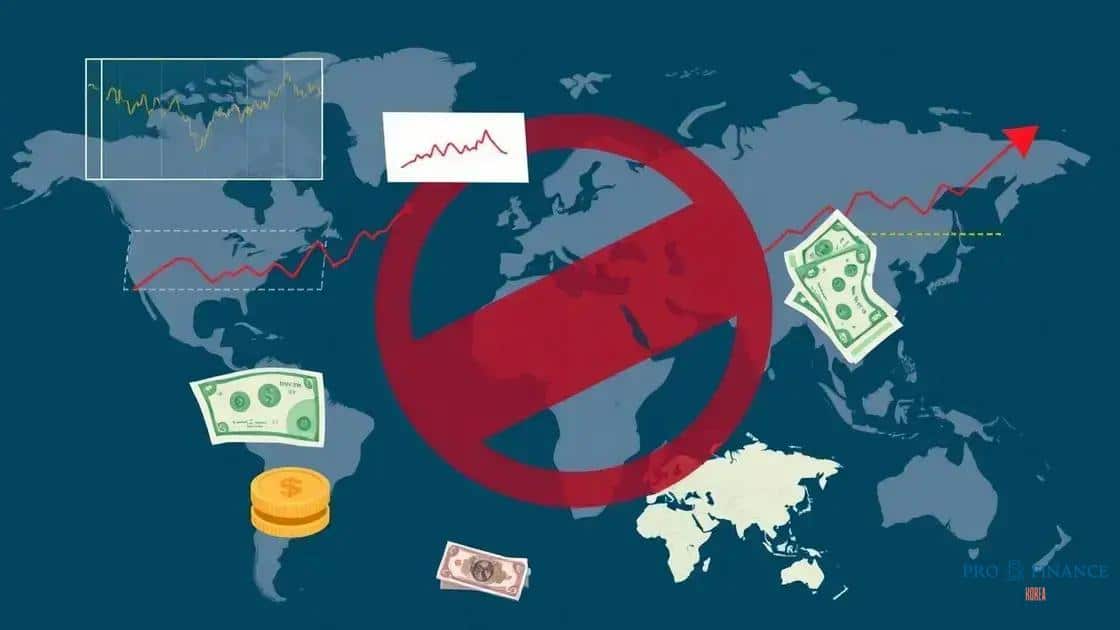The effects of global economic sanctions on financial markets

The effects of global economic sanctions on financial markets include currency depreciation, stock market volatility, and significant economic challenges for targeted countries, necessitating strategic adaptations by investors and businesses.
The effects of global economic sanctions on financial markets are significant, shaping investment landscapes and economic stability worldwide. Have you ever wondered how these sanctions ripple through trade and finance?
Understanding global economic sanctions
Understanding global economic sanctions is crucial for grasping their impact on international relations and financial systems. These sanctions are measures imposed by countries or international bodies to influence another nation’s behavior, often for political or security reasons.
Governments can restrict trade, finance, and travel. Such actions can vary significantly in terms of their intensity and focus.
Types of Sanctions
Sanctions can be categorized into several types, each with different implications:
- Trade sanctions: These restrict the exchange of goods and services.
- Financial sanctions: These limit access to financial markets and banking systems.
- Travel bans: These prevent specific individuals from entering countries.
These different forms of sanctions can severely affect a nation’s economy. For instance, countries under severe trade sanctions may experience shortages of essential goods, leading to higher prices and increased poverty levels. This relationship between sanctions and economic distress can create unrest within the impacted nations.
The Rationale Behind Sanctions
Understanding why countries impose sanctions is critical. They are often viewed as a non-military approach to compel compliance or change behavior. For instance, sanctions may be intended to:
- Pressure governments to change policies.
- Promote human rights.
- Prevent the proliferation of weapons.
The effectiveness of sanctions is debated. Critics argue they can hurt the population more than the target government, while supporters claim they can lead to positive changes without military intervention. Ultimately, the impact of global economic sanctions can ripple through various sectors, affecting everything from international trade to domestic stability, and it remains vital to analyze their broader implications as they evolve in today’s interconnected world.
How sanctions affect currency values

Understanding how sanctions affect currency values is essential for grasping their economic impact. When countries impose sanctions, they can create a ripple effect that influences exchange rates worldwide.
One major effect is the depreciation of the sanctioned country’s currency. As investors lose confidence, they may sell off that currency, leading to a drop in its value. This decline can increase the costs of imports, which can further harm the economy.
Factors Influencing Currency Value Under Sanctions
Several factors contribute to currency fluctuations in the face of sanctions:
- Investor confidence: If investors believe a country is unstable due to sanctions, they often withdraw their investments.
- Trade balance: Reduced exports can worsen a country’s trade deficit, negatively affecting the currency.
- Speculation: Traders may speculate on the future value of the currency, leading to increased volatility.
The impact of sanctions can also extend beyond immediate currency depreciation. For example, countries may struggle to access international financial markets. This lack of access can make it difficult for them to secure loans or engage in trade, further exacerbating economic challenges.
Case Studies of Currency Impact
Several nations have faced dramatic currency changes due to sanctions. For instance, the sanctions placed on Iran significantly weakened its currency value. Similarly, Venezuela’s economy has suffered under sanctions, leading to hyperinflation and a severe drop in its currency value. Observing these cases helps illustrate the broader implications of sanctions on national economies.
Additionally, the effects of sanctions can extend globally. Countries that depend on trade with sanctioned nations may also experience economic fallout. This interconnectedness highlights the importance of understanding how sanctions affect currency values in the larger context of global finance.
The impact on stock market stability
The impact of sanctions on stock market stability can be significant, influencing investor sentiment and market performance. When sanctions are imposed, they often lead to increased uncertainty in the markets, causing volatility.
Investors tend to react to news of sanctions by selling off shares in affected companies. This reaction can lead to a sharp decline in stock prices. For example, when sanctions were announced against Russia, stock prices in various sectors experienced a rapid downturn as investors anticipated reduced profits.
Market Reactions to Sanctions
Several factors contribute to market instability when sanctions are involved:
- Investors’ fears: Concerns about economic downturns can trigger panic selling.
- Sector exposure: Companies that rely heavily on international trade may see larger fluctuations.
- Global impact: Sanctions can affect not only the targeted nation but also global markets, as trade relations change.
Furthermore, sanctions often lead to shifts in market dynamics. Industries that previously thrived may suffer, while others may find opportunities for growth. For instance, companies in nations that are not affected by sanctions might benefit from increased demand in markets where others cannot operate.
Long-term Effects on Stability
The long-term effects of sanctions on stock markets can be profound. Continued uncertainty may prompt investors to seek safer assets, leading to reduced market liquidity. This trend can affect overall economic growth, as companies may struggle to raise capital. In turn, the stability of financial markets can be jeopardized, leading to potential recessions in the most impacted regions. Understanding how sanctions impact stock market stability is crucial for making informed investment decisions.
Case studies: countries under sanctions
Examining case studies of countries under sanctions provides valuable insights into the real-world effects of these measures. Countries like Iran, North Korea, and Venezuela have all faced significant sanctions, each experiencing unique economic challenges and responses.
Iran has been under sanctions focused on its nuclear program. These sanctions have led to a significant decrease in oil exports, which is vital for its economy. The consequences include a weakened currency and high inflation, severely impacting daily life for Iranian citizens.
North Korea’s Economic Isolation
North Korea’s situation is equally complex. Faced with international sanctions due to its nuclear weapons program, the country has seen its trade drastically reduced. This isolation has caused severe shortages of food and basic goods. The government often resorts to unusual measures to sustain itself, such as engaging in black market activities.
Venezuela’s Economic Crisis
In Venezuela, sanctions aimed at the government have exacerbated an already grim economic crisis. As oil revenues plummeted due to sanctions, the nation faced hyperinflation and widespread shortages of essential items. Citizens have struggled for basic necessities, leading to mass emigration in search of better living conditions.
These examples illustrate that the effects of sanctions extend beyond the targeted governments to affect the general population significantly. Understanding the experiences of these countries helps highlight the complexities and humanitarian concerns associated with economic sanctions. Each case serves as a reminder of the interconnectedness of global politics and economics.
Navigating financial decisions amid sanctions
Navigating financial decisions amid sanctions presents challenges for investors and business leaders alike. When countries impose sanctions, it can drastically alter the financial landscape, making it crucial to adapt strategies.
Investment portfolios may need reevaluation. For instance, sectors that rely on international trade, like energy and technology, often face significant risks. Investors should consider diversifying their portfolios to include assets that are less affected by geopolitical tensions.
Key Considerations for Financial Decisions
When making financial decisions during sanctions, here are some important factors to consider:
- Risk Assessment: Understand the risks associated with investments in sanctioned countries. This may involve reviewing current holdings and analyzing potential losses.
- Market Trends: Keep a close watch on market trends, as sanctions can lead to volatility. Following news and expert opinions can help in making informed choices.
- Emerging Opportunities: Sanctions can create new opportunities in unaffected markets. Identifying sectors or companies that may thrive during sanctions can yield better returns.
Additionally, staying informed about changes in policy is vital. Sanctions can evolve, and new regulations may emerge, which can significantly impact financial markets. Engage with financial advisors and trade experts who can provide insights specific to your situation.
Trade and Currency Strategies
Trade strategies must also adapt when sanctions are in place. For example, businesses may need to look for alternative suppliers or markets to reduce dependence on affected regions. Currency fluctuations due to sanctions can also affect transactions. Understanding exchange rates and potential volatility is essential for protecting financial interests.
In conclusion, navigating financial decisions amid sanctions requires a proactive approach, including risk assessment, market analysis, and adaptability. Remaining informed and agile is key to successful decision-making during these uncertain times.
Navigating the effects of global economic sanctions on financial markets is crucial for investors and policymakers alike. As we have seen through various case studies, each country responds differently to sanctions, impacting their economies, currencies, and stock markets. Investors need to remain informed and adaptable to mitigate risks and seize opportunities that arise during these times. By assessing risks, understanding market dynamics, and exploring new avenues, individuals and businesses can thrive despite the challenges posed by sanctions.
FAQ – Frequently Asked Questions about the Effects of Global Economic Sanctions on Financial Markets
What are global economic sanctions?
Global economic sanctions are measures imposed by countries or international organizations to influence another nation’s behavior, often for political or security reasons.
How do sanctions affect currency values?
Sanctions can lead to the depreciation of a sanctioned country’s currency due to a loss of investor confidence and reduced trade.
What impact do sanctions have on stock markets?
Sanctions can create volatility in stock markets, leading to decreased investor confidence and significant fluctuations in stock prices.
How should investors adapt to sanctions?
Investors should assess risks, diversify their portfolios, and stay informed about market trends and regulatory changes to navigate financial decisions during sanctions.






